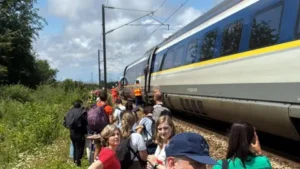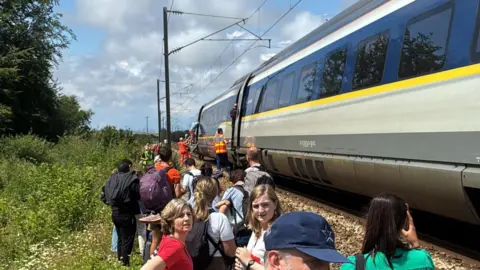On a recent day marked by travel complications, a Eurostar train experienced a situation that led to the evacuation of its passengers after an extended four-hour wait due to a breakdown in northern France. Reports emerged from passengers who recounted their harrowing experience aboard the train, which was ultimately halted near Calais. The incident underscored the challenges that can arise during long-distance travel via rail systems that traverse several countries.
Passengers aboard the troubled train expressed their frustrations as they awaited help, with one individual noting the uncomfortable conditions, describing the lack of air conditioning during the long wait. This discomfort was particularly evident as emergency services and local rescue teams finally arrived on scene to distribute water to the stranded commuters. This intervention was a welcome relief for those who had been idly waiting for assistance amidst rising temperatures and growing anxiety.
One prominent passenger, James Grierson, shared his story of evacuation alongside a group of “very frustrated” travelers. Compounding their frustrations was the absence of any communication or indication that a replacement train was on its way to transport them to their intended destinations. Eurostar, the rail operator that runs the service connecting London with mainland Europe, was approached for comment regarding the situation but had reportedly previously asked passengers to remain seated and patient as they awaited further updates through their social media channels.
The train, which had been operating a service from Brussels to London, suffered from an electrical failure just ten minutes outside of Calais, as explained by Mr. Grierson. This unfortunate incident not only disrupted their journey but also left questions about the maintenance and reliability of the trains which are crucial for travel across such vital connections in Europe.
Photographs taken at the scene depicted a scene of chaos with dozens of passengers stepping out of the immobilized train. Local rescue teams in high-visibility jackets were observed assisting in the evacuation process, with one team member notably carrying bottles of water to offer relief to those affected by the breakdown. Such images painted a stark picture of the operational challenges faced by rail services, especially during peak travel times.
In this situation, let it be noted that several passengers took to social media to express their grievances. They voiced concerns not only about the absence of air conditioning but also about the overflowing toilets aboard the train and the apparent lack of timely updates from Eurostar. In response to some of these comments, the rail operator did issue apologies and indicated that a replacement train had indeed been arranged to facilitate the passengers’ completion of their journey.
While this incident did highlight significant operational setbacks, it serves as a reminder of the complexities involved in running an extensive rail network across multiple countries, particularly in times of technical failure. Eurostar’s service, which plays a crucial role in connecting key European cities, may undoubtedly face scrutiny after such events, but it is equally essential to recognize the importance of timely and effective communication during crises to mitigate passenger frustration.
In conclusion, the evacuation of the Eurostar train near Calais reflects not only the need for reliable service but also the importance of customer service. As travel continues to be a primary mode of transportation for many, ensuring the comfort and safety of passengers should remain a top priority for companies like Eurostar.











